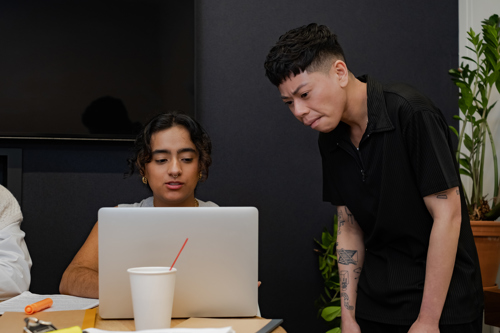World Menopause Day: breaking the silence in the workplace
Each year, World Menopause Day on 18 October presents a crucial opportunity to raise awareness about menopause. This is especially true in the workplace where it often remains a taboo subject despite such a large proportion of the workforce being affected.
My name is Gemma Fieldsend, and I’m a mental health trainer for the Charlie Waller Trust. Three years ago, I would have admitted to being quite naïve about the menopause; it simply wasn’t something I thought about much. Fast forward to 2024, and I find myself grappling with the complexities of the menopause firsthand.

The physical and psychological effects—poor sleep, brain fog, and self-doubt—have made everyday life more challenging. As someone who’s always taken pride in being capable and effective, these changes were and are hard to accept.
We’ve made great strides in addressing mental health in the workplace, but the same focus needs to be directed at the menopause. Like mental health, menopause affects us all differently, and with the right support, we can navigate this stage of life in a positive way.
Menopause is not just about hot flushes. It often comes with a wide range of symptoms like anxiety, mood swings, joint stiffness, and sleep disturbances, which can all significantly impact an employee’s work.
Why menopause matters at work
Menopause is not just about hot flushes. It often comes with a wide range of symptoms like anxiety, mood swings, joint stiffness, and sleep disturbances, which can all significantly impact an employee’s work.
Around 13 million people in the UK are currently peri- or post-menopausal, and for many, symptoms can last for up to 15 years. This reality makes menopause a workplace issue.
Consider these statistics:
- 1 in 4 menopausal experiences involve severe symptoms that can be debilitating.
- 10% of menopausal people leave their jobs due to menopause-related challenges.
Yet, 72% of cisgender women (cisgender refers to someone whose gender aligns with the sex they were assigned at birth) in the workplace feel unsupported, and nearly 90% say they can’t openly discuss their symptoms with their managers.
This silence perpetuates stigma and isolation at a time when what’s needed is understanding and support.
Dispelling myths and breaking the taboo
One of the biggest challenges in addressing the menopause is the lack of accurate information. veryone’s experience is different, and symptoms can vary widely in type and intensity.

Menopause doesn’t occur at the same age for everyone: and some may experience it in their 30s, while others go through it much later.
The unpredictable nature of symptoms often leaves those who go through them feeling like they’re "going mad," with many experiencing heightened anxiety or depression. Without proper support, they may face a dip in productivity, take frequent sick leave, or even leave their jobs altogether.
There is a lot of ignorance around the menopause experience of trans and gender expansive people. Menopause can affect people of all genders.
There is a lot of ignorance around the menopause experience of trans and gender expansive people. Menopause can affect people of all genders. Transmasculine or non-binary people who are assigned female at birth also experience menopause if they are not on a masculinising hormone therapy regime.
A workplace that strives to fully support people experiencing menopause is one that includes the trans experience.
How workplaces can help
Creating a supportive workplace starts by breaking the silence around menopause. Here are six steps that can help build a menopause-friendly environment:
- Training and awareness: equip managers and staff with knowledge about menopause and how to support colleagues who are going through it.
- Implement policies: clear guidelines on how to support employees during menopause can include flexible working hours and workplace adjustments like better temperature control.
- Menopause champions: designate individuals who can offer advice and support to colleagues dealing with menopause.
- Normalise conversations: open forums, wellbeing discussions, and a culture that encourages employees to seek help can make menopause a normal part of workplace conversations.
- Include trans people: be intentional in including trans people and their experiences when talking about menopause, use inclusive language, refer to multiple genders, work with the LGBTQIA+ community to create and share resources
- Flexible working arrangements: adjust start times, allow remote work, or offer extra breaks to accommodate those experiencing severe symptoms.
- Peer support networks: encourage employees to share their experiences and coping strategies in peer groups.
A business case for supporting menopause
Supporting menopause in the workplace is not just about doing the right thing; it also makes business sense. Organisations that offer menopause support have reduced absenteeism, improved retention rates, and fostered a culture of loyalty and productivity.
By taking small, practical steps today, workplaces can create an environment where menopause is discussed openly, ensuring no-one experiencing it feels left behind.
By taking small, practical steps today, workplaces can create an environment where menopause is discussed openly, ensuring no-one experiencing it feels left behind.
Let’s make World Menopause Day the starting point for a lasting conversation – one that brings menopause out of the shadows and into the open. With the support of friends, colleagues, managers, and employers, we can all help create a compassionate, inclusive workplace where all employees can thrive at every stage of life.
Why not book a menopause awareness webinar with Charlie Waller Workplace to get started?
Charlie Waller Workplace webinars
Let’s work together to make the workplace a more inclusive and understanding space for everyone.
References and resources
Menopause Support: menopausesupport.co.uk/?page_id=60
Menopause Friendly UK: Menopause and LGBTQIA+: Time for an Inclusive Conversation - MENOPAUSE FRIENDLY UKM
The Menopause Charity: themenopausecharity.org
Gender GP – What is menopause and who exactly is affected by it?: gendergp.com/menopause-gender-inclusivity-workplace/
CIPD Menopause Guide: cipd.org/uk/knowledge/guides/menopause-people-manager-guidance/
Menopause Matters menopausematters.co.uk
Menopause in the Workplace - How do hormonal changes effect the trans and non-binary community: menopauseintheworkplace.co.uk/articles/how-do-hormonal-changes-affect-the-trans-and-non-binary-community/




